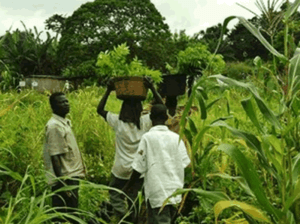Weak research, extension linkage hampering agricultural development – Director
 A major constraint posed to effective agricultural development is weak linkages between research and extension in many developing countries including Ghana.
A major constraint posed to effective agricultural development is weak linkages between research and extension in many developing countries including Ghana.
Agricultural research institutions need strong extension services to work in a field problems-oriented mode, and the extension services need the backstopping of strong applied agricultural research institutions to effectively serve the farming communities.
Pognaa Fati Issaka Koray, the Wa Municipal Coordinating Director, said in a speech delivered on her behalf during the 2021 Research-Extension-Farmer Linkage Committee (RELC) Planning Session in Wa.
She said it was for this reason that on April, 1989, the then Ministry of Agriculture held the first National Seminar on Research and Extension Linkages to enable stakeholders including Researchers, Extension Experts and Policy Makers to share ideas on how to improve the weak linkages existing between research institutions and extension services in the country.
She said again in 1994, the Ministry of Food and Agriculture (MOFA) and the Council for Scientific and Industrial Research (CSIR) institutionalized these linkages through the creation of Research-Extension-Farmer Linkage Committees (RELCs), which were to serve as an interface between the National Agricultural Research System (NARS) and the National Agricultural Extension System (NAES).
“Their primary purpose was to create a bridge between research, extension, farmers and agribusiness. The ultimate aim was to make research and extension to provide more demand-based services,” Pognaa Koray noted.
The Municipal Coordinating Director noted that in line with the policy, MOFA in 1998 decentralized and developed authority for planning and implementation of agricultural development programmes to the regions and districts.
“The role of RELCs have now become even more relevant and challenging in view of Ghana’s current development policy, which laid much emphasis on decentralization.” she said.
Pognaa Koray noted that in view of the decentralization policy, in the year 2000, the Zonal RELCs were replaced with 10 regional RELCs to deal with regional specific issues, adding that RELCs have made reasonable progress towards the achievement of the objectives for which they were set up.
These objectives include: Ensure that research activities, especially adaptive research, respond to farmers’ constraints identified through the district planning sessions; ensure Bi-monthly technical review meetings (BMTRMs), training of Agriculture Extension Agents (AEAs), farmers training, field demonstrations, Farmer Field Fora (FFF), Farmer Field Schools (FFS), and farmer field days are based on issues identified during district planning sessions.
The others are review progress made by research and extension in solving farmers’ problems and efforts made to promote proven technologies and best practices and to monitor adaptive research and extension activities at the district levels.
Pognaa Koray therefore urged all participants to take keen interest in the constraints faced by farmers and thoroughly scrutinized them to arrive at workable solutions, which will help better the food security situation in the Municipality and Ghana at large.
Mr Hudu Abu, the Acting Wa Municipal Director of Agriculture, noted that RELC was an annual platform created for farmers to freely discuss their agricultural production constraints with relevant experts, their colleague farmers and other major stakeholders in the agriculture sector for possible solutions and directives for redress.
Mr Iddrisu Mahamud, the Municipal Agriculture Officer in-charge of Extension, took the participants through some of the constraints faced by farmers with regards to livestock and poultry; roots, tubers/tree crops; vegetables; and cereals and legumes.
Source: GNA
